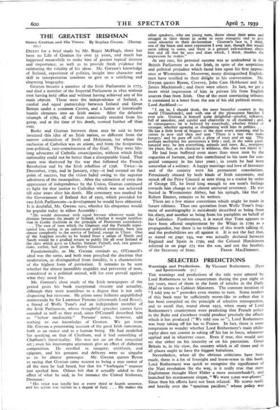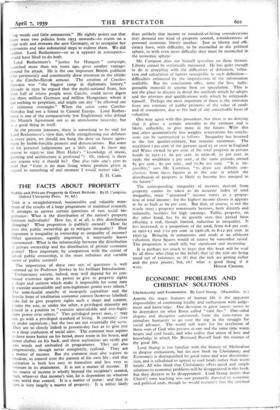SELECTED PREDICTIONS
THE warnings and predictions of the title were uttered by Lord Rothermere to his countrymen during the past eight or ten years, most of them in the form of articles in the Daily Mail or letters to Cabinet Ministers. The constant iteration of " I told you so " provokes even worms to turn. Some readers of this book may be sufficiently worm-like to reflect that it has been compiled on the principle of selective retrospection, and to recall that, round about 1923, when many of Lord Rothermere's countrymen were predicting that French policy in the Ruhr and elsewhere would produce precisely the effects which it has produced (" We told you so "), Lord Rothermere was busy taking off his hat to France. In fact, there is some temptation to wonder whether Lord Rothermere's main philo- sophy does not consist in taking off his hat to force, whenever applied and in whatever cause. Even if true, this would cast no slur either on his sincerity or on his patriotism. Great Britain is, in his view, the country which at all times and in all places ought to have the biggest battalions.
Nevertheless, when all the obvious criticisms have been made, there is a lot of foresight and horse-sense in this book. Lord Rothermere was quick to recognise the significance of the Nazi revolution (by the way, is it really true that most Englishmen thought Herr Hitler a mere mountebank?), and launched his rearmament slogan, " We want 5,000 war-planes." Since then his efforts have not been relaxed. He scores easily and heavily over the " spurious pacifists," whose policy was
'Dig words and little armaments." He rightly points out that there were two policies from 1933 onwards—to rearm on a large scale and overawe the new Germany, or to recognise her grievances and take substantial steps to redress them. We did neither. Lord Rothermere—or so it appears in retrospect— would have liked to do both.
Lord Rothermere's " justice for Hungary " campaign, launched more than ten years ago, gives another vantage- ,round for attack. He is the one important British publicist who persistently and consistently drew attention to the chinks in the Czecho-Slovak armour. The creation of Czecho- Slovakia was " the biggest ramp in diplomatic history." Already in 193o he argued that the multi-national State, less than half of whose people were Czechs, could never digest the three million Germans and million Hungarians whom it did nothing to propitiate, and might one day " be elbowed out of existence overnight." When the crisis came Czecho- Slovakia had not a friend in Central Europe. Lord Rother- mere is one of the comparatively few Englishmen who defend the Munich Agreement not as an unwelcome necessity, but as a good thing in itself.
At the present juncture, there is something to be said for Lord Rothermere's view that, while strengthening our defences at every point, we should not bang the door on future agree- ment by feeble-forcible protests and denunciations. But some of his personal judgements are a little odd. Is there any reason to suppcse that Herr Hitler's " knowledge of music, painting and architecture is profound "? Or, indeed, is there any reason why it should be? One also rubs one's eyes to read that " there is no man living whose promise given in regard to something of real moment I would sooner take."
E. H. CARR.











































 Previous page
Previous page